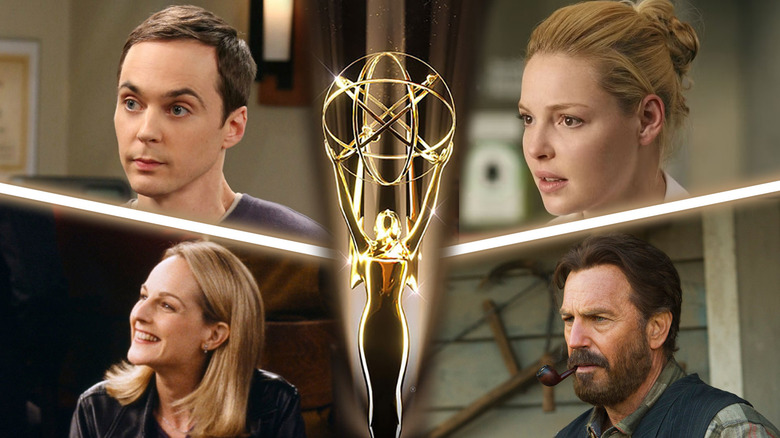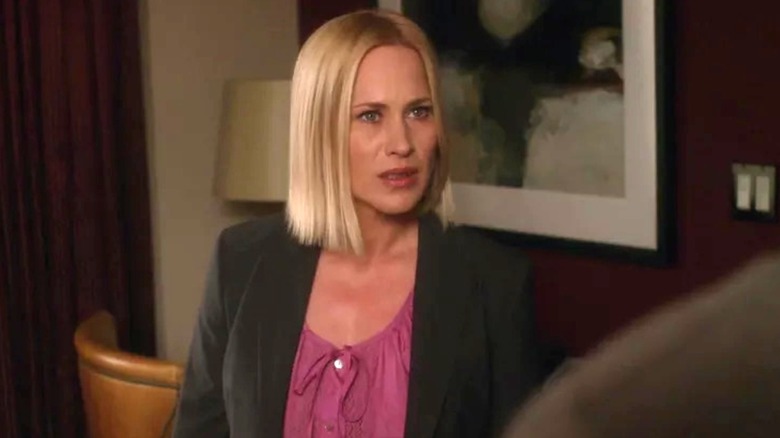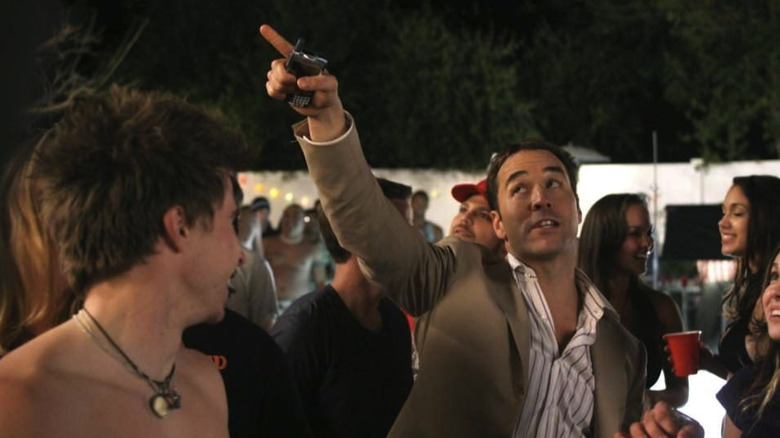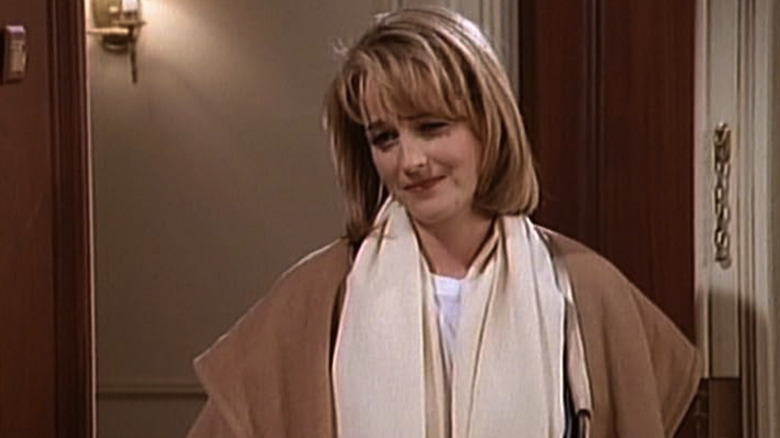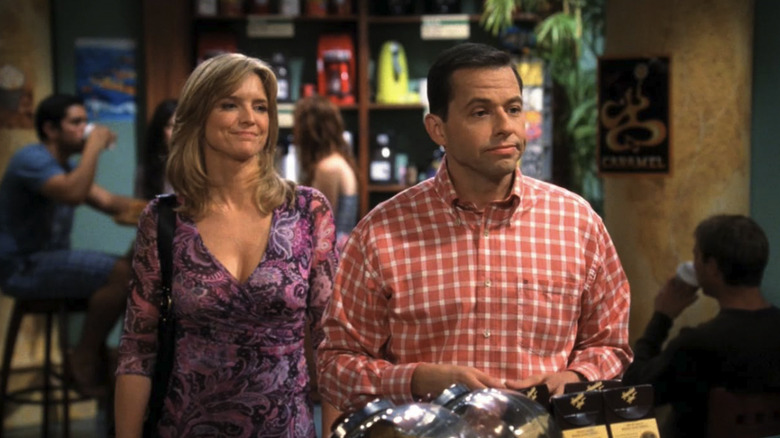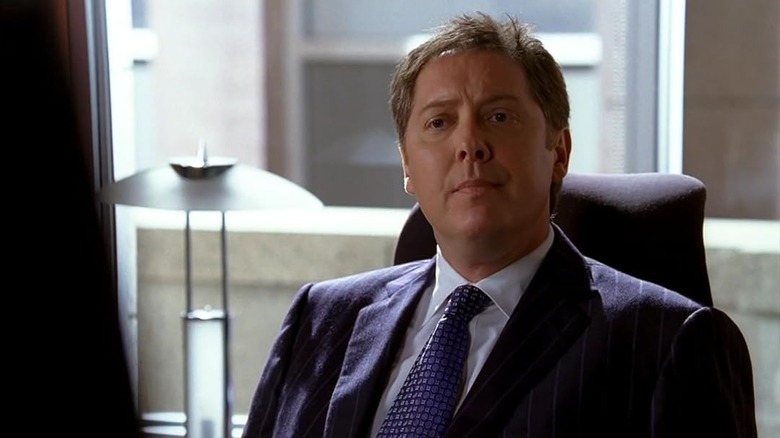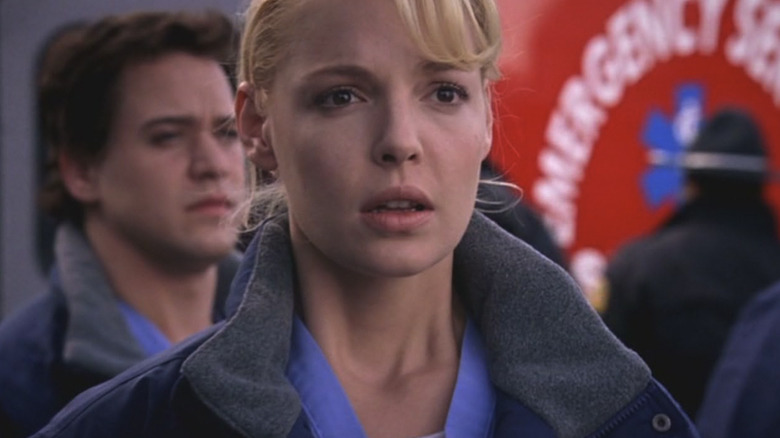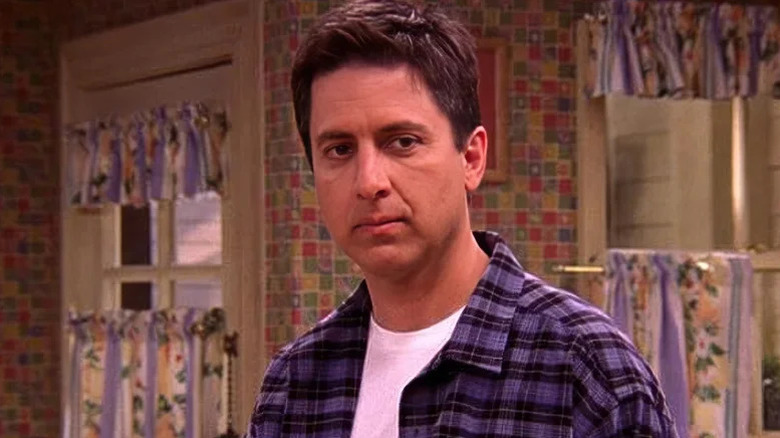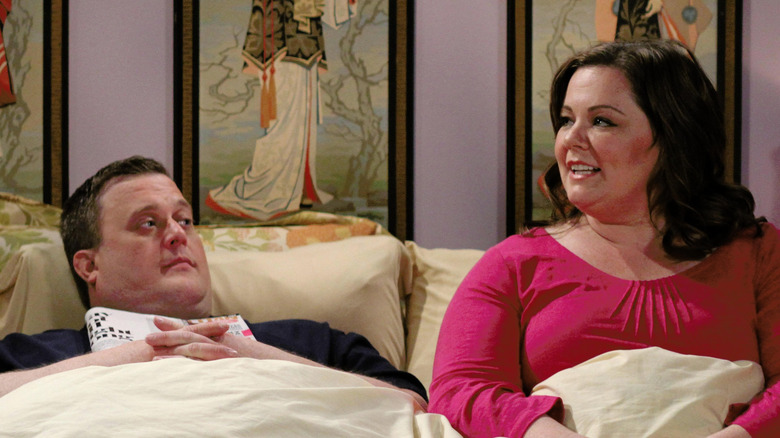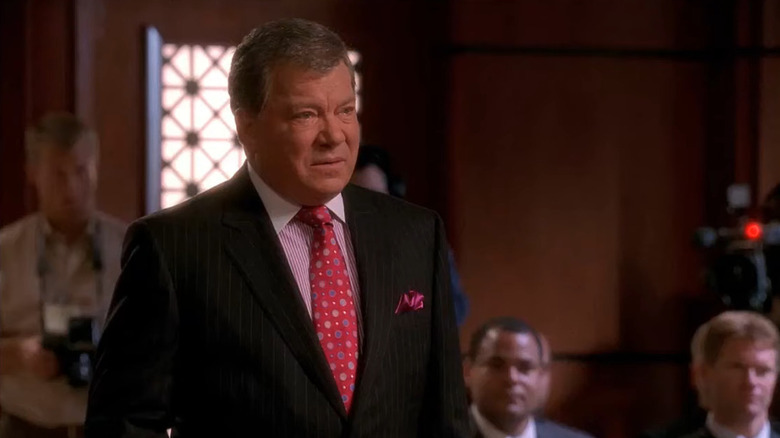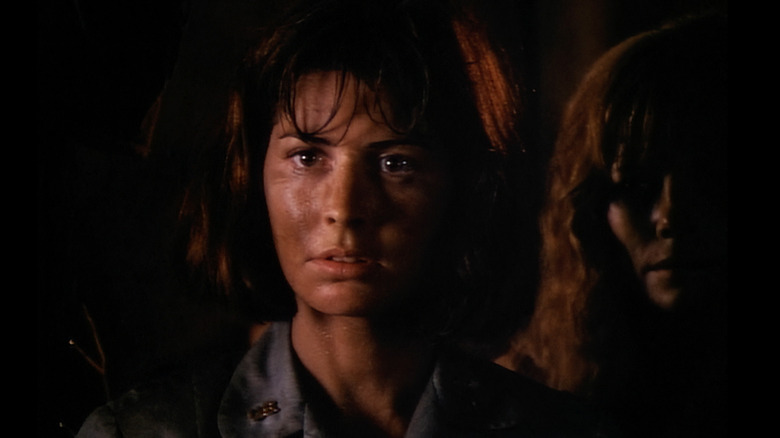15 Actors Who Didn't Deserve Their Emmys
The first Emmy Awards took place on January 25, 1949, at the Hollywood Athletic Club. The ceremony only recognized shows produced and aired in Los Angeles, and a total of only six awards (none for acting) were given out that night. Today, the Emmys hand out 26 awards, 12 of which are for acting.
Originally a homegrown show, the Emmys have grown in prestige, generating an industry of their own. Like their movie counterpart, the Oscars, the Emmys require campaigning on the part of actors and networks/streamers, a ton of PR management, and a whole lot of money. Because of this, the Emmys don't serve as an objective marker of talent. Awards can be political, and voters don't always make decisions based on merit alone. Components like an actor's overall standing in the industry or the meta-narratives crafted about their career trajectories often factor into the voting process.
The Emmys have handed out hundreds of acting awards over the years, and looking back, not all of them were the right choice. Sometimes the Emmys honor veteran actors over younger performers who delivered better performances. Other times, flashy newcomers overpower pros who deserve recognition. We've created a list of 15 actors who didn't deserve their Emmys — not because they're untalented, but because looking back, it just shouldn't have been their year.
Jim Parsons winning Lead Actor in a Comedy Series for The Big Bang Theory
"The Office" is one of the most beloved comedies of the 21st century, making its star, Steve Carell, a comedy legend. Despite the show's critical and commercial success, Carrell never won an Emmy for "The Office," despite being nominated five times. 2011, the year of Carrell's final nomination, was the biggest blow.
Jim Parsons of "The Big Bang Theory" won Outstanding Lead Actor in a Comedy Series that year, a decision that still irks fans of "The Office" today. While "The Big Bang Theory" was a hugely popular show with millions of viewers each week, it hasn't earned a place in the comedy hall of fame like "The Office," and many elements of the show have aged poorly. For Parsons to win over Carrell and Alec Baldwin (who, to be fair, had already won for "30 Rock" twice) two years in a row felt like a huge snub, especially considering it was Carrell's last chance to win as that character. In 2010, Parsons also beat out Larry David for "Curb Your Enthusiasm," who was nominated seven times but never won.
Patricia Arquette winning Lead Actress in a Drama Series for Medium
The mid-2000s were a great era for television. Only a few years into the prestige TV boom, "The Sopranos," "The West Wing," "The Wire," "Lost," and "Six Feet Under" were all airing in 2005. Recognizing this abundance of quality programming, it seems strange that a pretty average TV show like "Medium" took home a top prize that year.
Though Patricia Arquette is an incredible actor, as seen in shows like "Severance" and films like "True Romance" and "Boyhood," her Lead Actor in a Drama Series win seems like a puzzling choice. Consider the actresses she was up against: Glenn Close for "The Shield," Frances Conroy for "Six Feet Under," Jennifer Garner for "Alias," and Mariska Hargitay for "Law and Order: SVU." It's not that Arquette can't compete with these actresses based on pure talent; rather, the TV show she was on and the material she was working with just don't stack up to the work of her fellow nominees.
Conroy, who delivered a powerhouse performance as the matriarch on "Six Feet Under," never won an Emmy for that show (or any other show), despite being nominated four times. Garner never won for "Alias," perhaps the best work of her career. (She was also nominated four times.) Giving the award to one of those two women feels like a better choice.
Jeremy Piven winning Outstanding Supporting Actor in a Comedy Series for Entourage
Let's face it: "Entourage" is best left in the dustbin of history. While it was popular at the time, it's one classic TV show that would never be made today. Rife with homophobia, misogyny, and toxic masculinity, it's hard to watch in 2025. Though ostensibly meant as a satire about Hollywood, the humor didn't cut as deep as it could have.
Nonetheless, its popularity at the time garnered Jeremy Piven an Emmy for Outstanding Supporting Actor in a Comedy Series. Piven indeed gives one of the show's best performances in a sea of mediocre acting, but does that mean he was the best supporting actor that year? Two actors stand out as more deserving: Neil Patrick Harris for "How I Met Your Mother," and Rainn Wilson for "The Office." Harris never won for "HIMYM," though he was nominated three times, nor did Wilson, nominated the same three years. And considering the actors who didn't receive nominations that year — the casts of "Arrested Development" and "It's Always Sunny in Philadelphia" were completely shut out — Piven's win looks increasingly out of place.
Helen Hunt winning Outstanding Lead Actress in a Comedy Series for Mad About You
Helen Hunt is a great actress. We love her in "Twister," "Cast Away," and "Pay It Forward." As such, her Emmy win for the sitcom "Mad About You" doesn't appear, at least on the surface, to be a grave injustice. But Hunt didn't win just one Emmy for the show — she won four years in a row, from 1996 to 1999. "Mad About You" isn't a bad show by any means, and it was well-liked at the time, but it's not as innovative, funny, and timeless as some of its competitors.
Hunt's four-year run meant she beat Ellen DeGeneres in her groundbreaking sitcom "Ellen," who was nominated four times as Lead Actress, three of which overlapped with Hunt's wins. Hunt also beat the legendary Fran Drescher as "The Nanny," and Calista Flockhart as "Ally McBeal" twice in that category. None of this is her fault, and in fact, Hunt temporarily disappeared from Hollywood after her '90s career peak because she didn't want that level of fame. Still, Emmys runs like this rarely seem fair, especially considering the other worthy nominees.
Jon Cryer winning Outstanding Lead Actor in a Comedy Series for Two and a Half Men
Though it ran for 12 seasons and was popular with viewers, "Two and a Half Men" was chronically panned by critics. But that didn't stop the controversial series from raking in awards. In 2012, newly minted series star Jon Cryer won for Lead Actor in a Comedy Series, in a move that surprised many. Cryer had already won an Emmy back in 2009 for Supporting Actor. When Charlie Sheen was fired from "Two and a Half Men" in 2011, Cryer was given his time in the spotlight. His win for Lead Actor in 2012 marked his final nomination for the show, which only happened because Sheen went off the rails.
Whether "Two and a Half Men" is actually funny is debatable, but there's no way Cryer out-joked his competitors in this category. He was up against Alec Baldwin for "30 Rock," who won in 2008 and 2009, and Larry David for "Curb Your Enthusiasm," who was nominated an astounding 18 times as an actor and a producer but never won.
James Spader winning Outstanding Lead Actor in a Drama Series for Boston Legal
In the 2000s, "The Sopranos" was the pinnacle of great television. It won 21 well-deserved Emmys over the course of its six seasons. But the series also missed out on many others, and one loss feels particularly egregious. In 2007, James Spader won the award for Outstanding Lead Actor in a Drama Series for "Boston Legal," his third win for playing the character of Alan Shore, which he originated on "The Practice."
Spader beat out James Gandolfini for the award, a loss that irked many. Though Galdonfini had won three times for playing Tony Soprano, 2007 marked the final season of the show, and it seemed fitting that he would win one last Emmy. Spader also took the win over Hugh Laurie in "House," who was nominated for his role six times but never won. That Spader won three times for a smarmy character that never grew or changed doesn't sit well with us. One might also question the characterization of "Boston Legal" as a drama, since it was equally funny and dramatic.
Jeff Daniels winning Outstanding Lead Actor in a Drama Series in for The Newsroom
Though Aaron Sorkin is a veritable screenwriting legend, not all of his projects have been winners. Take, for example, his 2012 series "The Newsroom," which divided critics and has been considered one of the worst HBO shows of all time. The show takes place in a newsroom, wherein the staff strives to bring back principled journalism and maintain a focus on objective truth. Sorkin's trademark idealism doesn't work here, as the characters all read as sanctimonious and the tone trends toward preachy.
Despite these criticisms (and more), Jeff Daniels, playing the show's lead anchor, won Outstanding Lead Actor in a Drama Series in 2013. Daniels was awarded over Bryan Cranston in "Breaking Bad," Jon Hamm in "Mad Men," and Kevin Spacey in Netflix's groundbreaking new show "House of Cards." Cranston had already won Lead Actor, and Hamm wouldn't win until 2015, for his eighth and final nomination. Spacey was also a contender for his industry-shaking series, though the voting body certainly wouldn't give him the award today.
Katherine Heigl winning Outstanding Supporting Actress in a Drama Series for Grey's Anatomy
Katherine Heigl's 2007 Emmy win wasn't a mistake in and of itself. But when you look at the context surrounding the award, it becomes more unfortunate. Heigl's win marked the first and only acting win for "Grey's Anatomy," the beloved, 22-season-long medical drama. Though Heigl wasn't undeserving of an award in general, did she deserve this award? She usurped both Chandra Wilson and Sandra Oh from her same show that year, and the fact that actors like Oh and Sara Ramirez never won feels unjust. Heigl also beat out Lorraine Bracco and Aida Turturro from "The Sopranos."
Heigl's relationship with the Emmys, and with "Grey's," became contentious the following year. She announced that she wasn't submitting herself for the Emmys because she believed the material wasn't up to snuff. The show's writers were offended by her statement, and years later, Shonda Rhimes told The Hollywood Reporter, discussing "Scandal," that "there are no Heigls in this situation." Heigl's Izzie Stevens left "Grey's Anatomy" in 2010, in of the most abrupt character departures in the show's history, casting Heigl's Emmy win in a bit of a strange light.
Kevin Costner winning Outstanding Lead Actor in a Miniseries or Movie for Hatfields & McCoys
The History Channel production "Hatfields & McCoys" is a fine show. The Western miniseries depicts a years-long feud between families in the 19th century, with Kevin Costner playing the patriarch of the Hatfields, and Bill Paxton playing the patriarch of the McCoys. Costner's Emmy award for Outstanding Lead Actor in a Movie or Miniseries is perhaps not the most misguided win in the ceremony's history, but it doesn't make a ton of sense.
Indeed, it seems likely that Costner won because of the novelty of one of our biggest movie stars deigning to act in a television program. (The show came out in 2012, before season 1 of "True Detective" opened the floodgates of film actors heading to TV.) If the award was based on talent alone, why not give it to Costner's co-star, Bill Paxton, who gives a more interesting performance? And take a look at Costner's competitors. Along with Paxton, he was up against the indomitable Idris Elba in "Luther," Benedict Cumberbatch in the first season of "Sherlock," and Woody Harrelson's fiery performance in the Palin/McCain HBO movie "Game Change."
Ray Romano winning Outstanding Lead Actor in a Comedy Series for Everybody Loves Raymond
Does everybody really love Raymond? The evidence is strong. The sitcom ran on CBS from 1996 to 2005, airing 210 episodes over the course of nine seasons. The show maintained its place in the Nielsen Top 10 for years, and was often lauded for its revival of the classic family sitcom format. As such, it may not come as a great surprise that Ray Romano won an Emmy in 2002 for his leading role in the series.
But was the award given to the right man? We'd argue no. First off, while Romano delivers a solid performance in the show, he's essentially playing himself, and the role doesn't require much range, nor does it evolve over the course of the series. He was up against Kelsey Grammer for "Frasier," Matt LeBlanc and Matthew Perry for "Friends," and Bernie Mac for "The Bernie Mac Show" (which, to be fair, is another series where a stand-up comedian plays himself). It was Perry's first and only time being nominated, while LeBlanc was nominated three times but never won. We know Romano is a great actor thanks to his work in projects like "No Good Deed," but did he prove his worth in 2002?
Melissa McCarthy winning Outstanding Lead Actress in a Comedy Series for Mike & Molly
Melissa McCarthy is one of our greatest comedic actresses. From her star-making turn in "Bridesmaids," a rare comedy performance that earned an Oscar nomination, to leading roles in films like "Spy," you'd be out of your mind to deny her talent. But did McCarthy deserve her 2011 Emmy win? Probably not. McCarthy received her golden statuette for the CBS sitcom "Mike & Molly," which was popular enough to run for six seasons but not particularly well-remembered. Her milquetoast character, Molly, hardly does the actress justice, and the fat jokes haven't aged well.
McCarthy beat out another one of our greatest living comedians, Amy Poehler, for the award. In another grave Emmys injustice, Poehler was nominated five times for Lead Actress in a Comedy Series for "Parks and Recreation" but never won, and has still only won one Emmy (for guest-hosting "SNL") out of dozens of nominations. We love McCarthy and relish her success, but "Mike & Molly" was far from the best use of her talents.
William Shatner winning Outstanding Supporting Actor in a Drama Series for Boston Legal
The originator of one of the most famous television characters of all time, William Shatner's name carries a lot of weight. As far as we're concerned, his outsized star persona is largely responsible for his 2005 Emmys win. Shatner had a lot to offer as Captain Kirk in "Star Trek" — his handsome face, his deep tan, and his flair for the dramatic. Few would call him an acting heavyweight, what with his penchant for hamming it up whenever possible.
Playing lawyer Denny Crane in "The Practice" and "Boston Legal," Shatner delivers a good performance, leaning into his image as an irritable old man. Still, his acting is quite broad, and whatever nuances Shatner might have as an actor aren't displayed here. His win for Outstanding Supporting Actor in a Drama Series seems more like a recognition of the man's legendary status rather than his unique talent. His competitors included Terry O'Quinn and Naveen Andrews from "Lost," two performances deserving of a golden statuette. And if the Emmys wanted to award a veteran TV actor, Alan Alda's turn in "The West Wing" would have been our pick.
Dana Delany winning Outstanding Lead Actress in a Drama Series for China Beach
Who is Dana Delany? The actress has been working consistently since the 1980s, appearing in shows like "Desperate Housewives" and playing the lead character in "Body of Proof." But her two Emmy awards come from a TV series few have heard of today. From 1989 to 1991, Delany starred in "China Beach," which follows a group of nurses working in a field hospital during the Vietnam War. Though critically acclaimed, the series never gained much of an audience, and the final season was delayed for a year before being cancelled.
Delany won Outstanding Lead Actress in a Drama Series twice, first in 1989 during the show's first season, and again in 1992, a year after the final season aired. While Delany's talent isn't in question, her two wins prevented some greats from taking their places in the Emmys hall of fame. In 1989, she beat out Linda Hamilton in "Beauty and the Beast" and Susan Dey and Jill Eikenberry in the popular series "L.A. Law." By far her most deserving competitor, Angela Lansbury, was nominated 12 times for "Murder, She Wrote" but never won. That Delany blocked Lansbury from winning twice doesn't sit well with us.
Doris Roberts wining Outstanding Supporting Actress in a Comedy Series for Everybody Loves Raymond
In the early 2000s, Doris Roberts did the impossible: She won four Emmys for portraying Ray Romano's mom in a CBS sitcom. Again, we're not questioning Roberts' acting prowess. What other performer could have achieved such acclaim for this role? Still, four Emmys seems like overkill. Her competition was stiff and included some of the most popular comedic actresses of the era. She beat all of Carrie Bradshaw's friends in "Sex and the City" (though Cynthia Nixon finally broke her run in 2004), Jennifer Aniston and Lisa Kudrow for "Friends," and Megan Mullally for "Will & Grace."
Most of those actresses were awarded before or after Roberts' string of wins, so there's nothing to be too upset about there. However, her final award in 2005 was one step too far. That year, she beat Jessica Walter for the beloved but under-awarded "Arrested Development." It was Walter's first and only nomination for the series, and Roberts' fourth win. Where's the justice in that?
Alex Rocco winning Outstanding Supporting Actor in a Comedy Series for The Famous Teddy Z
Have you ever heard of Alex Rocco? What about "The Famous Teddy Z?" The forgotten TV series won an Emmy award in 1990 before fading into obscurity. The show stars Jon Cryer as Teddy, an honest mail-room clerk who becomes a famous actor's agent. Rocco, best known as Moe Greene in "The Godfather," plays Al, an old-school Hollywood agent. Due to low viewership, the series was canceled during its first season, and five episodes remained unaired.
Taking into account the show's lack of impact, Rocco's Emmy win for Outstanding Supporting Actor in a Comedy Series is a perplexing choice. His fellow nominees seemed much better suited to win that year. He was up against two actors from "Cheers," Kelsey Grammer (before "Frasier" arrived) and Woody Harrelson. Charles Kimbrough from "Murphy Brown" and Jerry Van Dyke from "Coach" were also nominated. With "Cheers" and "Murphy Brown" at the height of their popularity, "The Famous Teddy Z" sticks out like a sore thumb.
